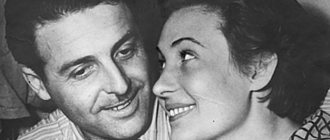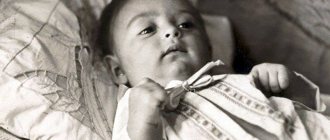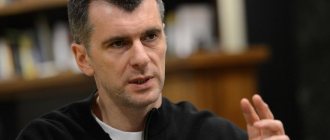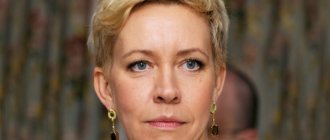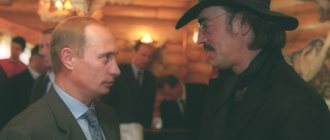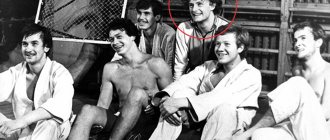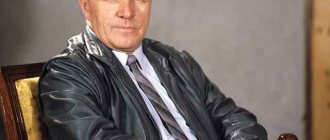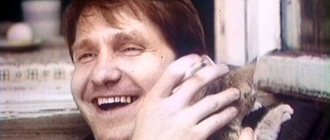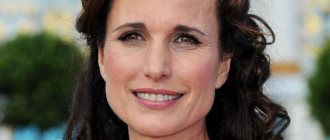Military childhood
Igor Gorbachev was born in 1927, October 20, in Leningrad. He entered secondary school No. 9, but the Great Patriotic War did not allow him to graduate. Gorbachev and his family were unable to leave the city on the Neva, and they fell into a blockade. The future actor survived a harsh winter, developing a severe form of dystrophy while working at defense facilities. At that time he was 14 years old.
In 1942, the Gorbachevs were evacuated to the Urals. At first they lived in the small town of Krasnouralsk, and then moved to Artemovsky. All this happened in the Sverdlovsk region. They returned to the liberated city in 1944. In the year the Great Patriotic War ended, Igor Gorbachev graduated from Leningrad school No. 79.
Childhood and adolescence
Igor Gorbachev went to school No. 9 in 1934, and after graduating from the 6th grade, remaining in besieged Leningrad, he survived the most terrible winter of 1941-1942. The boy, who suffered from severe dystrophy, still worked as best he could at the city's defense enterprises. In 1942, the family was evacuated to Krasnouralsk. The Gorbachevs returned to their hometown in 1944. In 1945, Igor Olegovich graduated from secondary school No. 79 and entered Leningrad University (Faculty of Philosophy), where he studied for three years.
At the beginning of his acting career
After receiving secondary education, he entered the Faculty of Philosophy of Leningrad University. At the same time, he began to participate in the work of the theater studio at the university, which was founded in 1944 by actress Evgenia Karpova.
In 1948 he received his first big role - he brought to life on stage the image of Khlestakov from Gogol's The Government Inspector. The work was appreciated and he took first place at the all-Union competition-review among amateur theaters.
In the same year, without graduating from the Faculty of Philosophy, he decided to connect his future destiny with the theater and entered the Ostrovsky Theater Institute. Today it is the Russian State University of Performing Arts. Until 1952, he studied in the class of the legendary Soviet actor and playwright Leonid Makariev, known for the films “The Street is Full of Surprises” and “Strike! Another blow!
Makaryev’s school benefited the student. Back in 1951, he made his film debut, playing the role of a student in the biographical film Belinsky by Grigory Kozintsev. And already in 1952 he received the main role, this time Igor Gorbachev playing Khlestakov on the big screen in the film “The Inspector General” by Vladimir Petrov.
Theater career
Since 1951, Gorbachev has been playing in the theater. His first place of work was the stage of the Bolshoi Drama Theater named after Gorky (now it has been renamed the Theater named after Tovstonogov). Here Gorbachev was remembered by the audience for his role as the sailor Shvandi in the play “Lyubov Yarovaya,” which was then repeatedly shown on television.
In 1954, Igor Gorbachev became an artist at the Alexandrinsky Theater. He linked his fate with this house of Melpomene until 1991. From a simple actor he grew to become the chairman of the artistic board, then he was an artistic director, and for 5 years in the 80s he became the chief director of the theater.
His first role in his new place was Vedernikov, the hero of Arbuzov’s play “Years of Wandering.” He played a lot in works based on Russian classics - “At the Lower Depths” by Gorky, “The Thunderstorm” by Ostrovsky, “The Adventures of Chichikov, or Dead Souls” by Gogol, “The Seagull” by Chekhov.
His last outstanding work was the role of the executor Scrambled eggs in Gogol’s comedy “Marriage”, directed by Alexander Galibin. This performance has been on the stage of the Alexandrinsky Theater since 2000.
The artist Igor Gorbachev, whose biography was closely connected with the Alexandrinsky Theater, nevertheless collaborated with other stage venues. For example, in 1993 he played King Lear at the St. Petersburg State Theater on Liteinaya.
Creation
Igor Gorbachev is the first performer of the role of Ostap Bender on Russian television in the television play “The Twelve Chairs” in 1966.
Roles in the theater
BDT named after M. Gorkovy
- 1951 - “Yarovaya Love” by K. A. Trenev. Production by I. S. Efremov - sailor Shvandya
- 1952 - “Ruy Blas” by V. Hugo - Don Cesar de Bazan
- 1953 - “The Servant of Two Masters” by C. Goldoni - Florindo Aretusi
Leningrad Academic Drama Theater named after A. S. Pushkin
- 1954 - “Years of Wandering” by A. N. Arbuzov - Vedernikov
- 1955 - “Life-affirming catastrophe” Sun. Vishnevsky. Director: Zhora Tovstonogov - Andrey
- 1956 - “On the Day” by M. Gorkovaty Directed by L. S. Vivien - Vaska Ash
- 1958 - “The Noble Nest” by I. S. Turgenev - Fedorvey Ivanovich Lavretsky
- 1958 - “Everything remains for the people” by S. I. Aleshina - Viktor Morozov
- 1963 - “The Thunderstorm” by A. N. Ostrovsky - Vanya Kudryash
- 1966 - “The Cause You Serve” by Yu. P. German - Vladimir Afanasyevich Ustimenko
- 1972 - “Tales of the Old Arbat” by A. N. Arbuzov - Fedorvey Kuzmich Balyasnikov
- 1974 - “The Adventures of Chichikov or Dead Souls” based on N.V. Gogol - Pavel Ivanovich Chichikov
- 1977 - “While the heart beats” by D. Ya. Khrabrovitsky. Director: Igor Gorbachev - Sergey Sergeevich Krymov
- 1978 - “Ivanov” by A. P. Chekhov - Nikolai Alekseevich Ivanov
- 1987 - “Cyrano de Bergerac” by E. Rostand. Director I. O. Gorbachev - Cyrano de Bergerac
- 1990 - “The Seagull” by A.P. Chekhov. Director: I. O. Gorbachev - Evgeniy Sergeevich Dorn
- 1991 - “Not everything is Maslenitsa for the cat” by A. N. Ostrovsky - Ermil Zotovich Akhov
- 2000 - “The Wedding” by N.V. Gogol. Director A.V. Galibin - executor Scrambled eggs
St. Petersburg Municipal Theater on Liteiny
- 1993 - Shakespeare's King Lear. Director: G. R. Trostyanetsky - Lord Lear
Filmography
- 1951 - Belinsky - student
- 1952 - Inspector - Ivan Aleksandrovich Khlestakov
- 1954 - Ship commander - Lieutenant Valery Aleksandrovich Plakusha
- 1956 - Crazy day - Kostya Galushkin, husband of Klava Ignatyuk
- 1956 - The Seekers - Viktor Potapenko
- 1958 - Milochka's illness - mother's brother
- 1958 - Our correspondent - correspondent for the newspaper “Our Life”
- 1959 - So they became strangers
- 1960 - Youth of an officer - political officer Berezin
- 1963 - Everything remains for people - Viktor Morozov
- 1964 - Returned Music - Eric Light-Eyed
- 1964 - Rabbit - bureaucrat Shabashnikov
- 1965 - Disaster - Ivan Fedorovich, deputy regional prosecutor
- 1965 - Musicians of the 1st Regiment - Daletsky
- 1965 - 1st guest - Velikhov
- 1965 - Now - a new attraction - Comrade Karpov
- 1965 - Through the icy darkness - Ogorodnikov
- 1966 - 12 chairs (director A. A. Belinsky) - Ostap Bender
- 1966 - In the town of S. - Turkin
- 1966 - Two tickets for an afternoon session - Nikolaev
- 1967 - Operation "Trust" - Yakushev, Alexander Alexandrovich
- 1968 - Dead Souls (director A. A. Belinsky) - Pavel Ivanovich Chichikov
- 1969 - Saved youth - Napman
- 1969 - These innocent fun - Kostya’s stepfather
- 1972 - Circle - Nikolaev
- 1972 - Sveaborg - Alexey Petrovich Ageev
- 1972 - Taming of Fire - Evgeny Ognev
- 1975 - Eldest son - neighbor in the window
- 1975 - Surprise - State Insurance agent
- 1975 - Eleven Hopes - Chairman of the Football Federation
- 1977 - Emelyan Pugachev - N. I. Panin
- 1977 - If you leave... - Yuri Ivanovich
- 1979 - Active zone - Vladimir Zarubin
- 1979 - Landing on Oringa - Khodotchinsky
- 1979 - Under the linden tree - Chegenev
- 1979 - Travel to another city - Ivan Yakovlevich
- 1979 - Old debts - Alexander Kochnev
- 1981 - Syndicate-2 - chairman of the court
- 1981 - Seven happy notes - Svyatoslav Rurikovich
- 1982 - Mama Maria - Bunakov-Fondaminsky
- 1983 - The understudy begins to act - Parshin
- 1983 - Behind the Blue Nights - Zabotenko
- 1984 - Saved his life - S. P. Botkin
- 1984 - Two Versions of 1st Impact - Eugene Bogart
- 1984 - Prokhindiada, or Running in Place - Misha Mikhailovich
- 1985 - Chokan Valikhanov - courtier
- 1985 - Future Century - employee of the CPSU Central Committee
- 1987 - Silver strings - Alexander III
- 1988 - Forgive us, garden... - Ilya Fedorovich Arnautov
- 1988 - Earthly Joys - Okolichny
- 1991 - My closest friend General Vasily, Joseph’s son is a doctor
- 1993 - Split - Zvolyansky
- 1998 - On knives - Bodrostin
- 1998 - I saw you first - Grandfather the Ventriloquist
Teaching work
In 1958, the still young 31-year-old Gorbachev began teaching at the Leningrad Institute of Theater, Music and Cinematography. Today it is the Russian State University of Performing Arts. He has been working here for more than 30 years, during which time he has produced a whole galaxy of worthy actors. Among them are Nikolai Fomenko, Alexander Bargman, Sergei Selin, Andrey Tolubeev and many others.
In 1992, he became one of several organizers of the School of Russian Drama, opened in St. Petersburg. The staff chooses him as the first rector. Here he taught for the rest of his life. In 2011, the university lost its independence, becoming the theater department of the St. Petersburg University of Service and Economics. But Gorbachev continued to work under such conditions.
Notes[edit | edit code]
- Gorbachev Igor Olegovich // Great Soviet Encyclopedia: [in 30 volumes] / ed. A. M. Prokhorov - 3rd ed. - M.: Soviet Encyclopedia, 1969.
- .Gorbachev, Igor Olegovich on the website Biography.ru
- ↑ 12
Gorbachev Igor Olegovich - Movie Constellation - author's project of Sergei Nikolaev - Television art / Kisunko V. G. // Great Soviet Encyclopedia: [in 30 volumes] / ch. ed. A. M. Prokhorov. — 3rd ed. - M.: Soviet Encyclopedia, 1969-1978.
- “Our Land” Krasnoyarsk regional weekly newspaper.
- ↑ 12
Faculty of Theater Arts “School of Russian Drama named after. I. O. Gorbachev" | ST. PETERSBURG STATE UNIVERSITY OF SERVICE AND ECONOMICS - Igor Gorbachev's grave
Film career
Igor Gorbachev is an actor who has played in almost 70 films. After successful roles in “The Inspector General” and “Yarovaya’s Love,” directors regularly invite Gorbachev to audition.
In 1966, he took part in another television play, which made him popular. Alexander Belinsky is staging “12 Chairs” based on the famous novel by Ilf and Petrov, Leningrad Television is making a television version of the play. It consists of two episodes, each approximately one hour long. In the coming years it will be regularly shown on central television. Gorbachev became the first performer of the role of Bender in Soviet cinema.
Soon Igor Gorbachev becomes one of the favorites of the film public. Films with his participation are reviewed over and over again. Among them are many successful works of Soviet cinema - Viktor Sadkovsky’s sports film story “Eleven Hopes”, Leonid Bykov’s comedy “Bunny”, Herbert Rappaport’s detective story “Two Tickets for an Afternoon Show”, Sergei Kolosov’s historical film “Operation Trust” and many others.
His last film work was playing the role of landowner Mikhail Andreevich Bodrostin in the film adaptation of Leskov’s novel “On Knives,” released in 1998.
Favorite theater
However, his native theater became LATD named after. Pushkin (now the theater has returned to its pre-revolutionary name - the famous “Alexandrinka”), to which he was accepted in 1954, and to which the actor will devote the best years of his life, will play many famous roles, and in 1975 will become its artistic director and chief director. He will retain this post until 1991. He staged grandiose productions that were included in the Golden Fund of Russian theatrical art - “Mary Tudor”, “While the Heart Beats”, “Veranda in the Forest”, “Field Marshal Kutuzov”.
Directing works
Igor Gorbachev, whose biography was most closely connected with the theater, also tried himself as a director.
He staged three television plays. The first, “Years of Wanderings,” in 1968, another 10 years later, together with theater director Arseny Sagalchik, “While the Heart Beats.” And finally, the drama “The Limit of Possibility” in 1981.
His work in the theater was more fruitful. He staged especially many works at the Leningrad Drama Theater named after Pushkin, later renamed Alexandrinsky. I started with the play “Platon the Krechet” by the Soviet playwright Alexander Korneychuk.
It was followed by “Mary Tudor” based on the works of Victor Hugo, “While the Heart Beats” by Daniil Khrabrovitsky, “Veranda in the Forest” by Ignatius Dvoretsky, “Evening” by Alexei Dudolev, “Federal Marshal Kutuzov” by Vladimir Solovyov.
In 1987, he staged one of his most successful plays, Cyrano de Bergerac, based on the play by Edmond Rostand.
Recognition and merit
- Honored Artist of the RSFSR (1962)
- People's Artist of the RSFSR (1968)
- People's Artist of the USSR (1972)
- Honored Worker of Culture of Poland (1974)
- Municipal Prize of the RSFSR named after K. S. Stanislavsky (1973) - for creating the appearance of our contemporary in performances
- Hero of Socialist Labor (1987)
- Order of Lenin (1987)
- Order of the October Revolution (1971)
- Order of Friendship of Peoples (1977)
- Order of the Red Banner of Labor (1982) - for the 225th anniversary of the Drama Theater. A. S. Pushkina
- Medal "For the Defense of Leningrad"
- medal "Veteran of Labor"
- full member of the Petrovsky Academy and Arts.
Family
Igor Gorbachev, whose photo in the 60-70s was well known to anyone who knew at least a little Soviet cinema, grew up in a difficult family. His father Oleg Borisovich was a hereditary nobleman, an educated man, and had a higher education as a civil engineer. In particular, he was one of the leaders in the construction of the Bolsheokhtinsky Bridge in St. Petersburg, which crossed the Neva River. The grand opening of this facility took place in 1909; initially it bore the name of Emperor Peter the Great.
Igor Olegovich's mother was a match for her husband. Also from a hereditary noble family. Her name was Vera Andreevna Maksimova. Even before the October Revolution, she graduated from the Smolny Institute of Noble Maidens as a foreign language teacher. She taught French and German at the gymnasium.
During the Civil War, Oleg Borisovich's two older brothers were shot by the Bolsheviks. They were 17 and 16 years old. Their names were Boris and Igor. Gorbachev's father named his two sons in their honor.
Igor Gorbachev's older brother Boris received a higher education and worked as an architect.
Igor Gorbachev
Soviet and Russian theater and film actor, theater director, teacher.
KinoPoisk: https://www.kinopoisk.ru/name/285814
The father of the future actor, Oleg Borisovich Gorbachev, is a civil engineer by profession, a hereditary nobleman, the youngest son of the captain of the Life Guards Cossack regiment, Boris Fedorovich Gorbachev. His father’s older brothers, Boris and Igor (17 and 16 years old), were shot in 1917 in front of their mother and younger brother. I. O. Gorbachev and his older brother were named in their honor. My father participated in the construction of the Bolsheokhtinsky bridge across the river. Neva. The elder brother Boris is an architect, following in his father’s footsteps.
Mother - Vera Andreevna (nee Maksimova), a hereditary noblewoman, graduated from the Smolny Institute, teacher of French and German. Igor Gorbachev always said that it was his mother who made him an artist. Studied at secondary school No. 9 in Leningrad. I completed six classes there. He survived the worst blockade winter of 1941-1942, having received a terrible form of dystrophy, and worked at Leningrad defense facilities. In 1942 he was evacuated with his family to Krasnouralsk. Returned to Leningrad in 1944. In 1945 he graduated from secondary school No. 79 in Leningrad.
In 1946-1949, Igor Gorbachev studied at the Faculty of Philosophy of Leningrad University and took part in the work of its famous Student Theater, created by E. Karpova. Gorbachev appeared on the stage of this theater since 1948, and his first big role was Khlestakov in “The Inspector General” by N.V. Gogol; For playing this role, Gorbachev received the main prize at the All-Union competition and show of amateur theaters.
In 1948 he went to study at the Leningrad Theater Institute, from which he graduated in 1959. In 1951, while still studying at the Theater Institute, he played Khlestakov in the film “The Inspector General” by V. M. Petrov.
In 1952, Gorbachev was accepted into the troupe of the Bolshoi Drama Theater, where he was remembered, in particular, for the role of the sailor Shvandi in the play “Lyubov Yarovaya,” which was filmed and shown in cinemas.
The Big Drama Theater was going through a crisis in those years, and in 1954 Igor Gorbachev moved to the Drama Theater. A. S. Pushkin; from 1975 to 1991 he was its artistic director.
Since 1974 he taught at the Leningrad Institute of Theater, Music and Cinematography, and since 1984 he has been a professor. Among the students are Sergey Makhovikov, Nikolay Fomenko, Sergey Selin, Andrey Tolubeev, Sergey Byzgu, Alexander Bargman, Igor Livanov, Mikhail Dolginin, Maria Kuznetsova, Sergey Losev.
He collaborated with the Liteiny Theater and the Andrei Moguchy Formal Theater - he voice-recorded the role of Kabanikha in the play “The Thunderstorm” based on A. N. Ostrovsky.
He was the honorary chairman of the Interregional branch of the NPSR for St. Petersburg and the Leningrad region; Deputy Chairman of the Soviet Peace Fund.
Igor Gorbachev died on February 19, 2003. He was buried on the Literatorskie Mostki of the Volkovskoye Cemetery in St. Petersburg.
Igor Olegovich Gorbachev had a large family: brother - Boris, nephews - Irina, Olga, Oleg, great-nephews - Anastasia, Daniel Philip, Veronica, granddaughter - Lyudmila Igorevna Gorbacheva, son (adopted) - Igor Igorevich Gorbachev, daughter-in-law Tatyana Yurievna Gorbachev, wife - Lyudmila Ivanovna Gorbacheva (nee Mitrofanova), Honored Artist of the RSFSR (1930-2010), buried next to her husband
Personal life
Actor Igor Gorbachev, whose personal life was successful, married a student at the theater institute Lyudmila Mitrofanova, with whom he lived together for more than half a century. From 1952 to 2010 she played at the Alexandrinsky Theater, in 1980 she was awarded the title of Honored Artist of the RSFSR.
First of all, she was remembered for her vivid theatrical images. For example, “Nina” in Arbuzov’s play “Years of Wanderings”, Irochka in “The Noble Nest” based on Turgenev, Miss Forsythe in Arthur Miller’s production of “Death of a Salesman”.
She was three years younger than her husband and died in 2010 at the age of 79. The Gorbachevs had a son, who was named, like his father, Igor. The granddaughter of famous artists received the name of her grandmother - Lyudmila.
The Gorbachev family in Leningrad lived together cheerfully and amicably. Nephews Oleg, Irina and Olga often visited, and later their children Philip, Veronica, Daniel and Anastasia.
Personal life of Mikhail Gorbachev
All this time, during which Mikhail Gorbachev went from a student who first came to Moscow to a high-ranking prisoner on the southern coast of Crimea, his devoted and beloved wife Raisa was next to him.
Mikhail Gorbachev with his wife
The ex-president of the USSR spoke about the history of their acquaintance, love and family life in his books. The center of the Moscow University, where Gorbachev studied as a freshman, was the Stromynka student club. This squat building, a former military barracks, was visited by the luminaries of Soviet cinema and pop music - Rostislav Plyatt, Ivan Kozlovsky, Vera Maretskaya, Sergei Lemeshev and other creative celebrities, in order to introduce young people to high culture, according to the old Russian tradition.
Dance evenings were also popular at that time, at one of which his friends Yuri Topilin and Vladimir Lieberman literally forcibly dragged Mikhail out of the dormitory, promising to introduce him to a stunning girl. The young man, who was preparing for the seminar, reluctantly put his books aside. Then he did not yet know that he had set out to meet his destiny.
Mikhail Sergeevich and Raisa Maksimovna Gorbachev. Love story On the set, he was introduced to philosophy student Raisa Titarenko, a calm and charming girl who at first did not pay any attention to Mikhail. They called each other “you,” although he was twenty and she was nineteen. The girl behaved strictly, and yet the young man lost his head.
As it turned out later, Titarenko at that time had a young man, a student at the Faculty of Physics, Anatoly Zaretsky, with whom the relationship was steadily heading towards marriage, until Anatoly introduced Raisa to his parents. The ambitious, plump lady, the wife of the Baltic “general of the railways,” categorically did not like the girl, and the would-be groom did not dare to contradict her mother.
Raisa Titarenko and Mikhail Gorbachev before the wedding (1953)
Raya was having a hard time with the breakup, but when she accidentally met student Gorbachev again, she did not refuse his offer to take a walk around Moscow. We walked for a long time and talked about a lot. Soon walks became almost daily. One summer evening they agreed that they would be together forever.
On September 25, 1953, Mikhail Gorbachev and Raisa Titarenko registered their relationship in the registry office. Only the closest friends witnessed the event; no special celebrations took place on this occasion. But, as Mikhail Gorbachev recalled much later, “later there was not a single year that we did not celebrate this day. Wherever this date found us - at home, on the train, on vacation, and even on the plane. Most often we celebrated just the two of us.” They wanted it that way. They felt so good.
Four years after the wedding, already in Stavropol, the only daughter of the Gorbachev couple, Irina, was born. Raisa Maksimovna worked as a lecturer for the Knowledge Society, and later gave lectures to students at Moscow State University while her husband was pursuing a political career.
Mikhail Gorbachev with his daughter
She became the first wife to break the traditional manners of the spouses of senior party leaders. Always supporting her husband’s progressive ideas, she accompanied him on trips around the country and on business trips abroad. At the same time, she always looked dignified and was able to carry on a conversation not only in her native language, but also in English. Raisa is some kind of miracle. I loved her and continue to love her, I still can’t believe that she’s gone. And it’s been nineteen years since she’s been gone.
Raisa Gorbacheva passed away in 1999
She passed away on September 20, 1999. The death of his beloved wife and friend was an irreparable loss for the ex-president of the USSR. In just a year, the first lady died of leukemia, despite all the efforts of German doctors from the oncology clinic. Versions were put forward that Raisa could have been irradiated during a visit to the Chernobyl nuclear power plant in 1989, or the test at the Semipalatinsk test site was to blame - a radioactive cloud also covered the city in which the 17-year-old girl lived.
On the tenth anniversary of his wife’s death, Mikhail Sergeevich released the disc “Songs for Raisa” with the help of Andrei Makarevich, where he himself performed seven romances that Raisa Maksimovna liked most. The lines about his wife in his books literally breathe love and enduring melancholy.
Mikhail Gorbachev performs a romance on his 85th birthday Gorbachev managed to become a grandfather twice (he has two granddaughters - Ksenia and Anastasia) and a great-grandfather (great-granddaughter Anastasia). His daughter Irina bears the surname of her first husband Virganskaya, although she is now married to businessman Andrei Tukhachev. The whole family moved to Germany, but regularly pays visits to Moscow and to the dacha in Kalchuga, where the first and last president of the Soviet Union prefers to live, to whom the people caring for him are assigned by status.
Mikhail Gorbachev with his granddaughters
